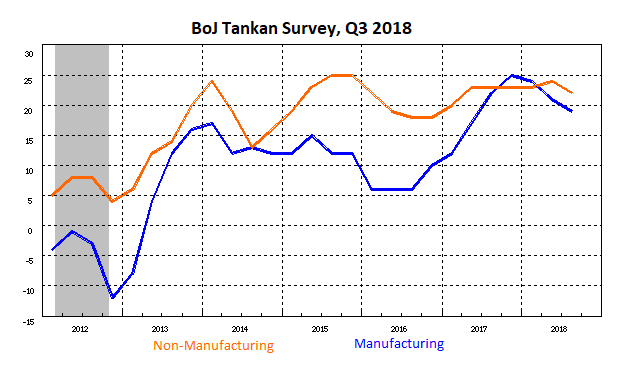The latest quarterly surveys from the Bank of Japan showed business sentiment among large manufacturers worsening for the third consecutive quarter.
The declines came amid concerns about increasing trade uncertainty as well as the impact of natural disasters. The U.S. is still negotiating a trade deal with Japan.
The Tankan surveys were measured across over 9000 firms between the periods of August 27 and September 28th. Of the total firms, 99.6 percent responded to the survey.
Manufacturing survey falls to 19
Data from the Bank of Japan measures confidence among companies. It includes the automobile, electronics makers among others. The manufacturing Tankan survey registered at 19 in September.
This was down from 21 in the second quarter and also missed estimates of an increase to 22.
The third quarterly decline showed a long streak of negative sentiment in the Tankan index since the periods of December 2007 and March 2009. The data underlined the view that growth in Japan, which is the world’s third largest economy might have slowed during the third quarter ending September 2018.
Weaker currency outlook
Firms that were selling production machinery were seen to be less optimistic. This view came due to slower demand from the tech industry. Other firms also voiced concerns about the U.S. administration’s efforts to cut the trade deficit with China and the European Union and Japan.
The U.S. President Trump had previously threatened to impose higher tariffs on automobile imports from Japan. This happens to be Japan’s primary export sector. However, just a week before, Trump promised to shelve the plans to raise tariffs as the U.S. is currently engaging in negotiations with Japan for a bilateral trade deal.
The oil and coal industry was seen to be losing confidence as the sentiment worsened. This came despite higher crude oil prices. Steel manufacturing firms who were already hit by the higher tariffs had to face higher costs for raw materials.
The Tankan survey showed that large manufacturers expect the Japanese yen to trade around 107.40 against the U.S. dollar for the fiscal year of 2018. This was slightly weaker when comparing to the average of 107.26 in June.
With the views on the currency also gloomy, the exchange rate could help the export industry to a certain extent. But at the same time, the weaker currency also meant that it would raise the costs of imports.
Non-manufacturing declines for the first time in two years
Sentiment in the non-manufacturing sector also soured. This was the first decline in the Tankan non-manufacturing index in nearly two years. The index for the industries included retail and real estate.
The non-manufacturing index showed a reading of 22. This was down from 24 in the previous quarter. A string of natural disasters was seen affecting the activity in the large firms during the summer months. It included the massive floods due to torrential rains in Western Japan in July and the typhoon in early September.
Natural disasters blamed for weak outlook
Due to the natural disasters, Osaka’s main airport was non-operational. This led to hotels and restaurants reporting a lull in the business activity. Even the transportation sector was hit as a result of natural disasters.
Natural disasters which have struck Japan also hit consumption with exports and production hitting the peak. The third quarter Tankan results showed that business confidence in Japan might have already peaked as the economy is likely to hit the ceiling as well.
Capital spending lower from June’s survey
Large manufacturers and non-manufacturers are those who have stock worth more than one billion yen. These firms reported that capital spending would increase by 13% during the fiscal year ending March 2018. Despite the increase, this was still 0.3 percentage points lower when comparing to the previous survey in June.
The firms said that they continued to suffer due to a shortage of workers. The employment conditions index fell to -23 marking the lowest reading since February 1992.
